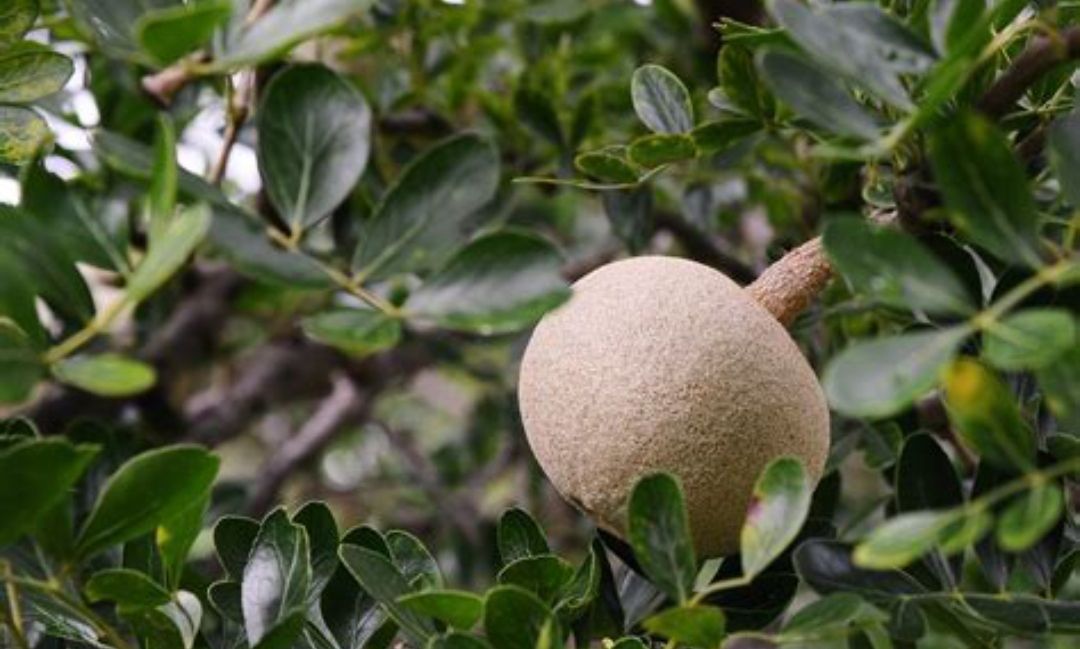Wood Apple, grafted
Grafted Wood Apple
Botanical name: Limonia acidissima
English names: Wood Apple, Elephant Apple, Curd Fruit, Monkey Fruit
Indian names:
- Hindi: ककैठ / कवठ (Kakaith / Kavath)
- Tamil: விலாம்பழம் (Vilam Pazham)
- Telugu: వెలగపండు (Velagapandu)
- Kannada: ಬೆಳದ ಹಣ್ಣು (Belada Hannu)
- Bengali: কাঠবেল (Kathbel)
- Malayalam: വിലംപഴം (Vilampazham)
- Marathi: कवठ (Kavath)
- Sanskrit: Kapittha
- Gujarati: કાઠોં (Kathum)
NOTE: this is not Bael Tree.
Origin and Spread:
Native to the Indian subcontinent, widely grown in India, Sri Lanka, and Southeast Asia. Strong traditional use in folk medicine, rural diets, and some regional rituals.
Plant uses:
Fruit is edible raw or processed into drinks, chutneys, and medicinal pastes. Pulp is used as a digestive tonic. The tree is extremely drought-hardy and useful in arid farming systems.
Fruit tasting profile and appearance:
Hard, woody round shell, dull green to grey. Pulp is sticky, brown, and aromatic. Flavour is tangy, sweet, and fermented—often mixed with jaggery or curd to improve palatability.
Historical health benefits:
Traditionally used for constipation, indigestion, respiratory issues, and general detoxification. High in dietary fibre, tannins, calcium, and antioxidants.
Ayurveda applications:
Used to balance kapha and vata. Treats chronic diarrhoea, haemorrhoids, and dysentery. Bark and leaves also used in decoctions for respiratory illness.
Medical and botanical studies:
- 2009 – Journal of Ethnopharmacology: Found antibacterial and anti-inflammatory properties in pulp extract.
- 2014 – Asian Pacific Journal of Tropical Biomedicine: Observed antioxidant effects in leaf and pulp.
- 2017 – Int. J. of Pharmacy and Pharmaceutical Sciences: Pulp extract displayed antifungal and antimicrobial activity.
Religious and cultural notes:
Not as sacred as bael (Aegle marmelos) but occasionally used in folk rituals. In some regions, it is symbolically associated with fertility and protection.
Soil preparation:
Grows well in poor, sandy, or rocky soils. Add compost and cow manure to help young trees establish faster.
Features:
Ideal prune height range: 2–4 m
pH growing conditions: 6.0–8.5
Shade or full sun: Full sun
Minimum pot year 5: 60 L
Time to fruit age: 4–6 years from seed
Interesting notes: Wood apple is a survivor—thrives on neglect, improves poor soil, and supports biodiversity.
Growing conditions:
- Full sun
- Tolerates drought and degraded soils
- Prune lightly to control shape
- Cold tolerance: ideal >18°C, tolerates down to 5°C
Watering requirements:
Low. Water weekly until established, then only in dry spells.
Pests and disease management:
Very pest-resistant. Occasional fruit flies or mealybugs may appear in heavy fruiting years.
Companion plants:
Plant near curry leaf, neem, or guava for a tough, low-input food forest. Encourages soil biodiversity.
Pollination:
Pollinated by flies and beetles. Often self-fertile but yields improve with nearby trees.
Propagation:
Usually grown from seed. Germination in 15–30 days. Can be air-layered or grafted for elite selections, though rarely done.
Rare, underused tree perfect for tough conditions and full of traditional value. Limited stock. Pickup from Parkwood (near Riverton) by appointment. Over 700 rare fruit trees on site—send your list for a quote.
Keywords:
Wood Apple Perth, Vilam Pazham plant, Kavath tree, edible Indian fruit, dryland fruit tree, Kapittha Ayurvedic tree, Limonia acidissima nursery Australia
